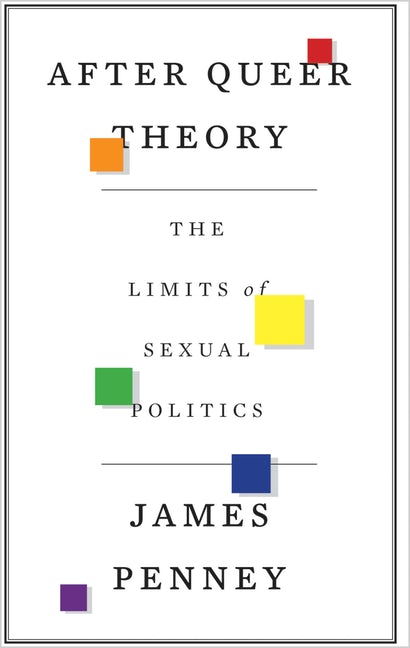James Penney’s After Queer Theory is a much-needed polemic in the ongoing debate around sexual politics, a debate which both encapsulates and the defines the ‘culture wars’. Language on the interface between the political and the sexual is constantly evolving and finding new conflicts that extend over the lines of both public discourse and private lives. Academics and commentators frequently fail to apply any socioeconomic context or political analysis of Late Capitalism to their work with the result that capitalism alone colours every reading and gets the last word in on meaning and how it’s communicated. The academic field of Queer Theory has had a profound effect on the vocabulary of progressive struggles, quickly spread in a combative evolutionary environment online. Its terminology and public image act to supply people with concepts to understand and advocate progressive sexual politics while others define themselves in reaction against them. A clear example of the importance of academic theory to the Right can be seen in the recent de-accreditation of Gender Studies in Hungary by the Orbán government. What is to the majority of people an esoteric field of literary and social studies is to the Right a monolithic institution corrupting and undermining ‘Western’ values, a dangerous and counter-cultural ideological unit that pervades society and by some implausible mechanism disturbs the social relations that make up the ‘traditional’ family unit, which is obviously a more palatable explanation to their audience than the idea that capitalism changed.
This book fundamentally contradicts the claim that Queer Theory is a dynamic powerhouse of subversion. James Penney argues that the field as it stands today has largely run its course and lost its steam as a centre of emancipatory force. Moreover, he extends this controversial premise to argue that the necessary action to re-activate it as a catalyst for social changes lies in a return to a Marxist and psychoanalytic conception of sexuality. To make his point, he engages in a materialist historiography of queer liberation politics in the 20th century, paying particular attention to the role economic and social conditions played in forging the academic understanding that is now termed Queer Theory. The embryonic stage of Queer Theory occured during a period in which universities were being commercialised and reorganised according to the discipline of market logic. This process reveals a missing ingredient in how the radical and collective political line of sexual politics which predominated in the 60s and 70s transformed into the insipid and capitalism-compatible version proffered by corporations and institutions today. On this historic journey, the critical moment was the proliferation of post-structuralism in Anglophone academic circles in the 90s (the mantras of which are uncritically recycled in current publications), after which class, gender and sexuality achieved their current status as separate but interlinked fluid categories of social difference. The immanent universality of the sexual throughout the body politic can thus be compartmentalised into individual lifestyles composed of a bricolage of ultimately essentialist building blocks. The schismatic disputations in which this school of thought broke with Marxism have largely been suppressed in the orthodox memory of the field. The inevitable outcome of this process has been the politicization of the sexual but the desexualisation of the political, as agendas move from universal collective goals to minoritarian concerns, their vision turning inward towards more geographically and economically privileged strata. Penney argues against the existence of a ‘transgressive’ sexuality as unintentionally normalising the false notion that there exists any form of legitimate sexuality. Essential to this is a repeated return to psychoanalytical theory to explain the impossibility of the normative sexual relation, and a repeated return to Marxism to explain the economic structure of social relations that form the basis for sexual identity in capitalism, the mode of production ‘dependent on crisis, imperialism and war’.

The author does not offer a vulgar Marxist rejection of sexual politics as unimportant or subservient to class, nor does he inveigh against postmodernist boogeymen, but rather works through the inevitable contradictions of an identitarian conception of the ‘community’ seeking political recognition of the sexual subject (which is ultimately a pre-constructivist project in the guise of a postmodernist one), concluding that sex “haunts the expression of all political judgement”. The sexual is more and more explicitly regarded as key to the development and rationale of political positions, with the emergence of phenomena such as the online incel culture which has attracted revulsion and curiosity by wearing on its sleeve a strain of right-wing thought that usually keeps its regressive and biologically determinist sexual mores latent. The muddled politicisation of sex as being a hierarchical resource under threat is not a recent innovation for the right. In 2012, NIPSA published a riposte to a report of the Taxpayers’ Alliance (a British right-wing anti-benefits thinktank) on its “2020 tax commission”. This response highlighted a bizarre line in the report that the opposition of the poor to welfare cuts was “partly plain old sexual jealousy at the root”. Clearly the psychological has a role in the political, and despite the inability of the political to define or systematise the psychological in its formal discourse, it reveals itself in occasional paranoiac outbursts such as these, and more broadly in the projected image of The Other that the Right oppose as invasive.
Penney devotes attention to the ideas of Freud that preconfigure modern queer dialogue, carefully navigating his theoretical landscape and critically re-assessing his whole body of work rather than focusing on his proclivities for heteronormativity. His work employs an eclectic armamentarium of thinkers in its arguments, ranging from early theorists such as Marx, Lacan and Freud to contemporary historic materialist authors like Teresa Ebert, Slavoj Zizek and Alain Badiou. This combination has a freshness that avoids being overly prosaic, rendering its core ideas comprehensible with effort. It is not an overly lengthy work but it is a challenging one and it is exactly in this subversive and uninhibited character that its relevance is demonstrated. It disturbs hegemonies and assumptions and serves the transformative quality that every good book has of forcing self-reflection. It distils and dissects recent and historical currents with equal precision and clarity.
Regardless of whether one agrees or disagrees with the premise and arguments of the author, it is a profoundly educational and thought-provoking work that merits recommendation. As Penney states from the outset, the current stagnation in academia and politics is not the end of anti-homophobic criticism, but an opportunity to rethink the connection between the political and the sexual, to recapture the revolutionary immediacy of materialist socialist praxis. FT.

